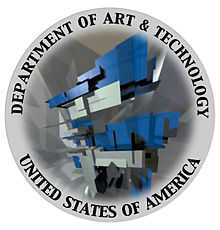Randall Packer
| Randall Packer | |
|---|---|
 | |
| Born |
January 23, 1953 San Jose, California |
| Nationality | American |
| Field | Multimedia Art, Music Composition |
| Training | California Institute of the Arts 1981 MFA, University of California Berkeley 1988 PhD |
Randall Packer (born 1953, America) is a contemporary multimedia artist.
Biography
Packer studied music composition with Mel Powell and Richard Felciano at the California Institute of the Arts (MFA) and the University of California, Berkeley (PhD). He pursued post-graduate study in computer music in Paris, where he was a composer in residence at IRCAM (Institute for the Research and Coordination of Acoustics), Centres Georges Pompidou, under Pierre Boulez. In 1988, he founded Zakros InterArts in San Francisco, producing events and new works that explored the integration of multimedia and live performance. The first event was the San Francisco Tape Music Center Retrospective, which led to extensive research into the history of multimedia and the avant-garde. Packer continued to create new works throughout the 1990s, pioneering collaborative forms of new music theater, installation and performance art that incorporated emerging technologies in computer music, video, animation, and interactivity. In 1995 he became the Director of the San Francisco State University Multimedia Studies Program, located in the heart of San Francisco's Multimedia Gulch where the "Wired" generation was coming of age. In 1997 he joined the faculty of the University of California, Berkeley, and was the first to teach digital media in the Department of Art Practice. In 1999, the sound installation Mori, a collaboration with Ken Goldberg and Gregory Kuhn, debuted at the InterCommunication Center (ICC) Biennial exhibition in Tokyo, Japan. Mori later toured museums throughout the US as part of the exhibition Telematic Connection: The Virtual Embrace, organized by new media curator Steve Dietz and Independent Curators International. In 1999, his Net artwork, the Telematic Manifesto, was included in the seminal net art exhibition, Net Condition, organized by Peter Weibel at ZKM (Center for Art & Media) in Karlsruhe, Germany.
Washington, DC


In 2011, he began extensive research into the future of online teaching in the media arts, joining the faculty of Johns Hopkins University, where he continues to teach multimedia in the Museum Studies program. In 2012, he created Open Source Studio (OSS), an exploration of new online methodologies for teaching multimedia art. The OSS project has led to collaborative research and online courses for the California Institute of the Arts, the School of Art, Design, and Media at Nanyang Technological University in Singapore, and the Museum of Modern Art in New York City.
Packer has received international acclaim for his multimedia and political artworks, with articles in the New York Times, Washington Post, and the San Francisco Chronicle. He has performed and exhibited at galleries, museums, theaters and festivals internationally, including ZKM (Center for Art & Media) Karlsruhe Germany, Transmediale in Berlin, Corcoran Gallery of Art in Washington DC, The Kitchen in New York City, the Oklahoma City Museum of Art, and Theater Artaud in San Francisco. His essays on art, technology, politics and culture have been published by MIT Press, the Leonardo Journal for the Arts & Sciences, LINK, ART LIES, and Cambridge University Press. His scholarly work has been incorporated into the curriculum of universities and art schools throughout the world. He is the recipient of numerous awards, including an ASCAP Prize for music composition, the George Ladd Prix de Paris from the University of California, Berkeley, three Artist Fellowships from the Washington DC Commission on the Arts & Humanities, and an Isadora Duncan Award.
External links
- Reportage from the Aesthetic Edge
- Zakros InterArts
- Multimedia: From Wagner to Virtual Reality
- US Department of Art & Technology
- A Season in Hell
- The Post Reality Show